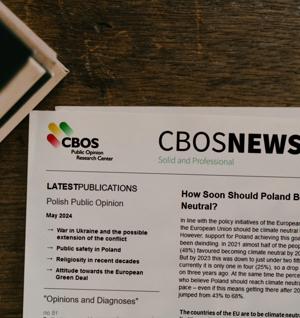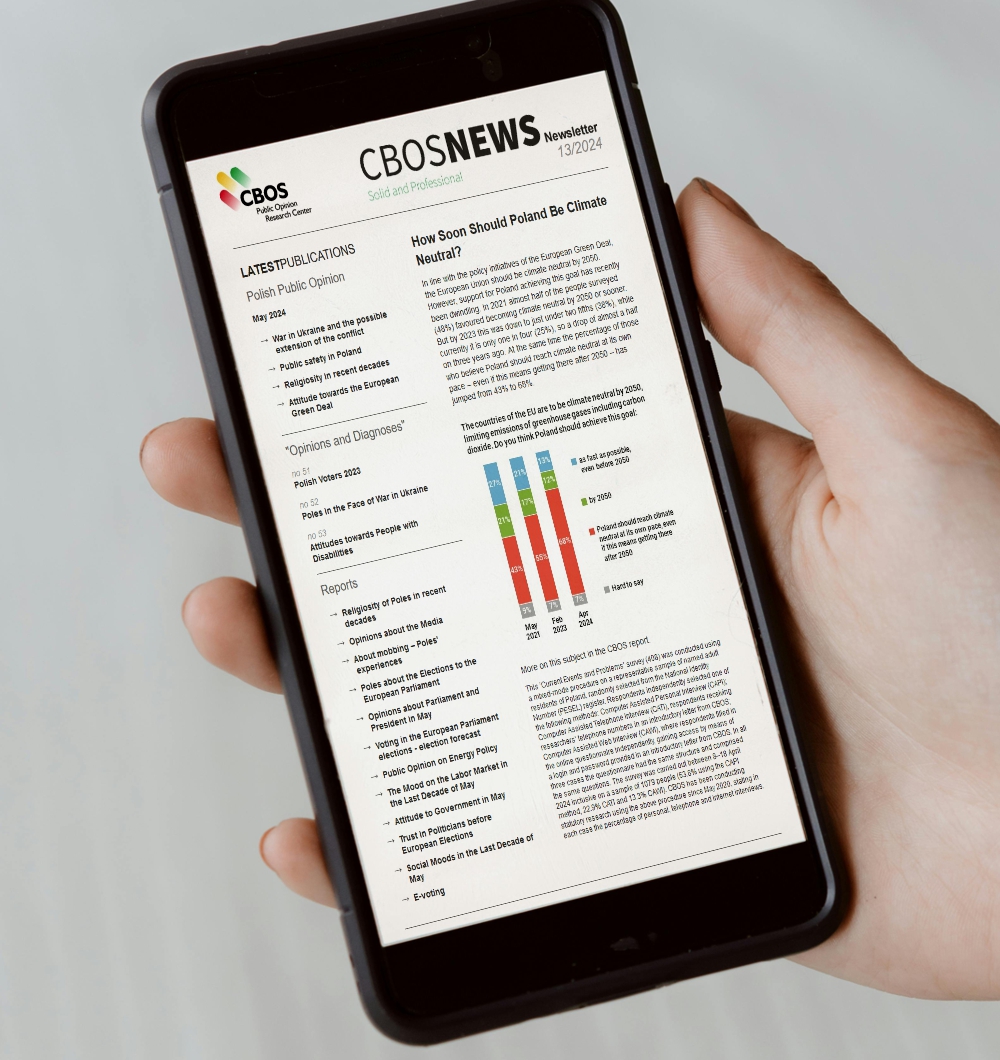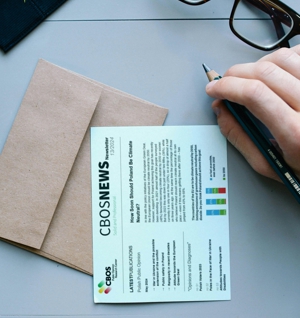CBOSNews
20/2020
Summer Holidays During the Pandemic

Despite the coronavirus pandemic and the various restrictions brought in by the authorities after the epidemic was officially announced on 20 March 2020, a significant part of Polish adults (42%) intend to go away this year for at least two days (with at least one overnight stop). At the same time, over a half of these (53%) say that the pandemic has changed this year’s holiday plans for them. Of those not intending to go away, just under a fifth (19%) have changed their previous plans. Overall, 36% of adult Poles say that they have had to change their earlier plans for this year’s summer holiday because of the pandemic.
2020-07-01
19/2020
Work and the Pandemic

The coronavirus pandemic has had an effect on the work lives of close to half (46%) of those Polish people who were working at its very beginning (1 March 2020).
2020-06-29
18/2020
Assessment of the Rate at which Pandemic Restrictions Are Being Lifted

In the judgement of close to half the people surveyed (48%) the government is easing rules and restrictions at an appropriate rate. Of the remainder, more think that restrictions are being lifted too quickly (31%) than too slowly (12%).
2020-06-26
17/2020
The Presidential Election: Participation and Voting Intentions

At the end of May and the very beginning of June, when the exact date of the presidential election was still unknown to the overwhelming majority of people in this survey, 84% of them said they wanted to vote in this election, and 72% were certain they would.
2020-06-16
16/2020
The Epidemic and Everyday Life

During the period of severest restrictions in connection with the epidemic, the following were indicated as the most oppressive of them: having to stay at home and being unable to go where you wanted (48%), parks and woodlands being out of bounds (45%) and having to cover your mouth and nose (44%). During the weeks of social isolation the most common feelings were, on the one hand, boredom with domestic routines (39%) and, on the other, loneliness (38%). The most frequently indicated positive aspect of isolation was a drop in living expenses (40%).
2020-05-22
15/2020
The Coronavirus Epidemic and Restrictions on Everyday Life

Two thirds of the internet users surveyed (59%) have indicated that they feel the current coronavirus pandemic is unprecedented, while a third (32%) are of the opinion that there have always been seasonal illnesses and epidemics, and that this one is nothing out of the ordinary.
2020-05-14
14/2020
The Effects of the Coronavirus Epidemic on Working Life

The SARS-CoV-2 coronavirus epidemic and the restrictions connected with it are having clearly negative effects in the area of paid work. From the answers of internet users it can be seen that, of those respondents who were in paid employment before the epidemic, 7% have lost their jobs and 24% work fewer hours. In addition, of those who were self-employed before 1 March 2020, 2% have had to close their businesses and a further 4% limit them. At present one in eleven employees (9%) is looking after children at home. Just under a quarter of those working before the epidemic (23%) have noted a drop in income.
2020-05-13
13/2020
Altruism or Egoism?

Almost three quarters of Poles (73%) say that today you should be sensitive to other people and ready to help them. One fifth (20%), on the other hand, believe you should focus on your own business and not pay attention to anyone else. The percentage of those tending towards altruism is not only higher than two years ago, when CBOS last conducted a survey on this issue, but is the highest since research began. At the same time the number of respondents with an egoistical approach is the lowest since research began.
2020-04-16
12/2020
The Katyn Massacre and Polish‑Russian Relations

The Katyn massacre is something that virtually all Polish people (97%) have at least some knowledge about. In the collective memory responsibility is ascribed chiefly to the Russians. Most of the people surveyed felt that the Russian side has not done enough to investigate this crime, which continues to weigh on relations between the two countries
2020-04-10
11/2020
Greater Trust in NATO, the EU and the UN

CBOS has been monitoring the level of trust in various institutions and organisations for close to twenty years.
2020-04-09
10/2020
Coronavirus Prevention

The CBOS March survey began just after the first officially diagnosed case of coronavirus SARS-CoV-2 was confirmed in Poland (on 4 March), and ended not long after (however bad that may sound) the first recorded death (on 12 March). Because of the dynamically changing situation, the data presented below have to be treated as historical, documenting perceptions of the situation and people’s behaviour right at the very beginning of the epidemic.
2020-04-03
9/2020
Attitudes to Hungarians

In connection with the Day of Polish-Hungarian Friendship, which falls on 23 March, it is worth emphasising that Hungarians are among the several nations that Polish people like best. Almost a half of those surveyed (48%) expressed liking for them, while dislike was declared by relatively few people (12%). It should be noted that the percentage of people with a positive attitude towards this nation has stayed relatively stable in surveys over almost three decades.
2020-03-31
8/2020
Perceptions of Poland’s Security

Most adult Poles (57%) are of the opinion that there is no threat at present to Polish independence, while 30% are of the opposite opinion. In February of this year, there was a significant improvement on May 2018 in the public perception of the country’s security. Generally, however, survey results from the last six years are negative compared to surveys from 1992-2013, which were carried out before the Russian Federation annexed Crimea.
2020-03-16
7/2020
What Polish People Think about the Changes to the Judiciary

The public assessment of the changes to the judicial system brought in by Law and Justice governments before and since the 2019 elections is not unequivocal. Among those surveyed, three virtually equal groups can be identified: those in favour of the changes (30%), those against (31%) and those in favour of some changes and against others (30%).
2020-03-13
6/2020
How Poles Felt about Themselves in 2019

The way Polish people feel about themselves has undergone some improvement since the previous, 2018, survey. In 2019 there was a rise to record levels in the percentage of respondents who experienced positive emotions, such as confidence that everything is going well, and pride in their achievements. At the same time there has been a slight drop in those who repeatedly felt ignored or put down by those in power, or were depressed. The percentages of respondents declaring that they frequently experienced states such as depression or rage are the lowest noted over the past thirty years. In general, it can be said that over this period the way Polish people feel about themselves has undergone a visible improvement. There has been an increase in respondents who experience positive emotions, with a simultaneous drop in the number of those reporting they often feel upset, irritated, sad, discouraged, bored, or angry.
2020-03-12
5/2020
How Many People Went on Holiday in 2019?

In 2019, 55% of adult Poles went away for at least two days, so virtually the same number as in 2017. This is 5 percentage points fewer than in 2018, which was a record year for the period since 2012, when research on the subject began. Compared to 2018, there were decidedly fewer adults holidaying within Poland (a drop from 51% to 44%), though trips abroad also fell from 24% to 23%.
2020-02-13
4/2020
Remembering Auschwitz

The Auschwitz death camp stands as a symbol of the genocide committed by Nazi Germany during World War II. In 2005 the United Nations General Assembly established International Holocaust Remembrance Day, with the date set as 27 January – the day on which Soviet soldiers opened the gates of the camp. Soon 75 years will have passed since that day.
2020-01-31
3/2020
Changes in the Perception of the Structure of Society

Poland is currently seen as substantially more egalitarian than in the 1990s. For the first time since research on this began, the most frequently chosen model to describe social structure is the one with the most middle levels. Over the last six years the percentage of people who see Polish society this way has doubled (from 14% to 28%). In the 1990s only a relatively small number of those surveyed (8-10%) had seen society in this way.
2020-01-24
2/2020
Polish People’s Values in 2019

After a gap of six years, people were again asked about the values they consider most important in their lives. Each respondent was presented with a list of values from which they could choose three. As in 2013, over four fifths of people put a happy family life in first place, with good health being in second place for 69%. In 2019 peace and quiet was in third place, chosen by 27% of respondents, and in fourth was integrity, indicated by 19% of those asked. In 2013 integrity had been in third place with peace and quiet in fifth. The significance of religious faith as one of the three most important values has grown in comparison to the previous survey, as have the prosperity of the nation and freedom to express one’s own opinion. At the same time, the importance of being respected and of work have dropped. In 2019, just as before, few people selected education, friends or wealth, and even fewer chose participation in democratic political and social affairs, access to culture, adventure or achievement and fame.
2020-01-22
1/2020
Forecasts for Poland for 2020

In the opinion of the public, last year was a good year for Poland, and the years 2018-2019 were seen by Polish people as the best period the country has had since the change of system in 1989. By comparison, forecasts for 2020 are less optimistic than in the last two years, though still better than those from the 2016 and 2017 surveys. A majority of people are likely to be looking to the future with optimism: 38% believe that 2020 will be better for the country than 2019, while 21% think it will be worse. Almost one in three of those surveyed (30%) do not expect any change in this respect, while 11% did not make any forecast.
2020-01-20
36/2019
How Much Are We Spending on Christmas?

Most people say that they are spending a similar amount on Christmas in 2019 as they did in 2018. The most stable predicted costs are the Christmas tree (72%) and decorations for the home (71%); somewhat less stable are the amounts allocated to presents (64%) and festive food (63%).
2020-01-17
35/2019
Which Professions and Trades Do We Respect?

Just as six years ago, firefighters today earn the greatest respect from the public. Other highly-ranked jobs are nurse, skilled worker, miner, university professor and doctor.
2020-01-16
34/2019
Why Stand for Parliament?

In October Poland elected new members to both houses of Parliament, the Sejm and the Senate. As part of the CBOS November survey, people were asked why they thought someone might want to stand for Parliament. This question has been asked before, most recently in 2011.
2019-12-12
33/2019
Alcohol Consumption in Poland

Since 2010 there has been a significant decrease in the consumption of beer as the most popular alcoholic beverage. Back then, every other drinker (52%) said they were most likely to choose beer, while at present only 39% of drinkers select this option. Wine is in second place (25%) and vodka in third (16%). The percentage of people choosing wine in preference to other kinds of alcohol has been growing since 2007, although the greatest increase has been in the consumption of quality spirits such as cognac or whisky: currently one in nine of all drinkers surveyed (11%) states that when they fancy a drink this is what they choose.
2019-12-06
32/2019
Coming Home from Abroad?

Although the subject of economic migration is much less in the forefront of public concern than it was only a few years ago, it continues to be an important social phenomenon. Polish people still look for work abroad fairly frequently. In the October survey just over one in ten respondents (12%) said that they had gone to work abroad at least once in the previous ten years.
2019-12-03
31/2019
How Effective Are Trade Unions?

People in Poland are much more likely to say that trade unions are ineffective rather than effective in their defence of workers’ interests (40% as against 27%). Moreover, decidedly negative assessments are much more frequent than decidedly positive ones (7% as against 1%).
2019-12-02
30/2019
Thinking about Death

The Polish custom of visiting graves and memorials on All Saints and All Souls Days can be conducive to thinking about death, also one’s own. While one in five Poles (21%) say they would like time to prepare for death, the majority of those surveyed (68%) would wish for death to surprise them.
2019-11-29
29/2019
Parents’ Spending for the Start of the 2019-2020 School Year

Parents say they have spent more than they did a year ago to cover their children’s needs at the start of the new school year. These expenses cover such things as textbooks, exercise books, writing and maths equipment, uniforms and non-optional payments such as insurance, tuition fees, boarding or lodgings. On average, parents of schoolchildren paid out 1120 zloty at the start of this school year, an average rise of 69 zloty on last year (107% of last year’s expenditure).
2019-10-28
28/2019
School Students’ Summer Holidays

2018 was a record year as regards the percentage of households that arranged for their school-age children to go away for at least a week during the summer holidays. Since then there has been a return to the levels observed in 2016–2017. This year a little over two thirds (68%) of households with school-age children arranged for them to go away for at least a week during the summer holidays. This is 6 percentage points less than last year. The decrease in households where all the children went away was even more marked, from 65% to 57%. Compared to 2018, there was a clear increase in households with school-age children which declared that none of the children went away for at least a week’s holiday (a rise of 6 percentage points to 32%) and a slight increase in those saying that not all their children went away (a rise from 9% to 11%). It is worth noting that for the fifth year running, the majority of households with school-age children were able to give all of them at least a week away. In the period 1993–2013 this percentage was considerably lower.
2019-10-08
27/2019
What Sort of Help Do Elderly People Need?

Almost a half of the people surveyed (46%) know somebody elderly who has problems with carrying out everyday activities by themselves. These are things such as dealing with officialdom, shopping, cleaning, cooking, dressing and washing. Six percent of respondents said they experienced these problems themselves.
2019-10-01
26/2019
What Are We Excluding from Our Diets?

Over the last year, just like five years ago, almost every fourth person (24%) excluded or limited some item from their diet. Of those restricting their diets, by far the greatest number (57%) were trying to limit sugar, including sweets and cakes. Fatty food was in second place (28%) and alcohol in third (20%). Ready meals, coffee and gluten were also avoided fairly frequently (14% each).
2019-09-24
25/2019
How People Feel about World War II and Where They Get Their Information

The 1st of September 2019 marks the eightieth anniversary of the outbreak of World War II. In the days immediately leading up to this date, people were again asked about their attitude to those tragic events, which overturned the established order and to a large extent determined the nature of the world today. Despite the passage of time and the diminishing number of people who experienced World War II directly, the overwhelming majority of Polish adults think that this is still a live part of Polish history, which people need to be reminded of all the time. What is interesting is that the number of people expressing this view is considerably higher now than five years ago. Concurrently, fewer people now think that World War II is a historical event from the past, which is not worth dwelling on. Over the period 2004 – 20014 no significant changes had been noted in the relative size of these two groups.
2019-09-20
24/2019
What Is Most Beneficial for Your Health?

Over the last three years there have been two jumps in the percentage of responses indicating that regular exercise is the key to good health. Currently this is the top answer, while up to and including 2016 it was in third or fourth place. A healthy diet comes a very close second to regular exercise. Here the percentage of responses has not changed significantly, with around a half of the people surveyed from 2012 onwards being of the opinion that a healthy diet is the most crucial thing for your health. The view that regular appointments with the doctor are the key is becoming less common; earlier around 30% of respondents chose this answer, but over the last three years this has diminished by 11 percentage points.
2019-09-19
23/2019
How Much Do You Need to Be Rich?

In our July survey we asked people to say at which point they thought wealth began. What sort of income (calculated per capita for each family member) would allow someone to be called really rich?
2019-09-18
22/2019
Attitudes to the Polish-US Declaration on Defence Cooperation

The Joint Declaration on Defense Cooperation Regarding United States Force Posture in the Republic of Poland has met with a positive reception from over a half (53%) of adult Poles. A negative attitude to the declaration was expressed by 15% of those asked, while almost a third (32%) had no opinion on the matter.
2019-08-01
21/2019
Increase in Online Viewing

Over a half of internet users (56%), which amounts to 38% of all adults, watch TV, films, serials or other kinds of videos online. This number grew noticeably at the end of the last decade, then again in 2013, and is currently greater than ever before. Online viewers are more often men than women and very clearly more often the youngest of adult internet users.
2019-07-30
20/2019
Attitudes in Poland to Homosexual Relationships

After a period of increasing acceptance of homosexual relationships there has been a reversal of this trend. Currently three fifths of people (60%) do not accept the legalising of civil partnerships for couples of the same sex, which is 4 percentage points more than in 2017.
2019-07-29
19/2019
Online Political Activity prior to the European Elections

This year’s elections to the European Parliament caught the attention of Polish voters to a greater extent than previous ones, which may be because, for the last few years, political emotions are clearly running higher than before 2015. This also finds expression in greater interest in politics online. Compared to the election of MEPs in 2014, there is increased online political activity both in the form of receiving information, generating content and direct political engagement.
2019-07-26
18/2019
Workers Capital Plans

Of the total people surveyed, 42% have heard of Workers Capital Plans, but among those to whom the programme is addressed, this percentage rises to 52%. This still means, however, that almost half of those for whom the programme is intended have not heard about its introduction.
2019-06-18
17/2019
Was it Worth Changing the Political System? The Changes Begun in 1989 Assessed

Coming up to the thirtieth anniversary of the partially free elections of 4 June 1989, over four fifths of the people surveyed (81%) thought that it was worth changing the political system then. The majority were very sure about this.
2019-06-17
16/2019
What People Think about the Warsaw LGBT+ Charter and Sex Education

In February 2019 the mayor of Warsaw, Rafał Trzaskowski, signed a declaration entitled Warsaw Policy for the LGBT+ Community, commonly known as the LGBT+ charter. This could be thought of as a local event, but the media have ensured that news of it has reached nigh on two thirds of people in Poland (63%).
2019-05-22
15/2019
Support for Poland’s membership of the European Union on the Eve of the 15th Anniversary of Joining and in Advance of Elections to the European Parliament

In the first weeks of April, less than a month before the 15th anniversary of Poland becoming part of the European Union, and in advance of the forthcoming elections to the European Parliament, support for Poland’s membership has reached a record high. Of the people surveyed, 91% in total declared their support, and 59% did so strongly. One in 20 respondents were not in favour of Poland’s presence in the EU, with only one in 100 being strongly against. By comparison, just after Poland joined the EU in 2004, the percentage of those against membership was four times higher than it is now. Also before the fifth and the tenth anniversary of Poland’s presence in the EU, the percentage of its opponents, though lower than immediately after accession, was considerably higher than at present. In April 2004, just before accession, support for Poland’s membership was clearly lower than afterwards.
2019-05-09
14/2019
Poland a Member of the European Union for 15 Years

The balance of Poland’s 15-year membership of the European Union is seen as decidedly positive, with the economic and financial benefits of joining being the most appreciated. No surprise then, that virtually three quarters of those surveyed (74%) could say in hindsight that had Poland not become a member of the EU the country would not be developing as well as it currently is.
2019-05-06
13/2019
The Use of Corporal Punishment for Children

The last seven years have seen a hardening of disapproval for using physical means of punishing children. More people than in 2012 believe that children should not be subject to this type of punishment (a rise of 10 percentage points, to 61%) and there is more frequent opposition both to giving a good hiding (a rise from 61% to 70%) and to giving a smack (a rise from 25% to 37%). Simultaneously, there have been proportionate decreases in the percentages of adults who find corporal punishment in general permissible (34%, a drop of 11 points), and who agree with the opinion that a good hiding never hurt anyone (25%, a drop of 9 points) or that there are some situations where you have to smack a child (61%, a drop of 12 points). Although a majority of Polish people do not approve of corporal punishment in general, and particularly of hitting children hard (a good hiding), there is still widespread social acceptance of smacking as punishment, although this is less frequent than some years ago.
2019-04-18
12/2019
Is Single Life More Interesting?

Nobody talks about spinsters and bachelors nowadays: the accepted word in Polish currently is singiel, from the English ‘single’. Because there are many definitions of what a singiel is, many different people could qualify for membership of this group. A somewhat simplified definition has been used for the purposes of this survey, focussing on those people who have taken a conscious decision to live without a long-term partner. It turns out that opinions in society are rather divided on the subject of life without a long-term partner, although a slight rise can be discerned in acceptance of this way of life. Currently virtually half of those surveyed (49%, a rise of 5 percentage points on 2013) accept a single lifestyle, while over two fifths (45%, a drop of 4 points) are unfavourably disposed towards it.
2019-04-15
11/2019
Opinions Regarding the Budget Deficit

One of the main topics of public discussion recently has been the state of the nation’s finances. A majority of people think that government spending should never exceed government revenue (66%). Although every fourth respondent might allow that a small excess of spending over revenue could be permissible in the case of financial shortfall in key areas of social expenditure (27%), there is no social acceptance for spending outstripping revenue to any significant degree (only 2% of those surveyed admitted such a possibility). People are in favour of greater financial discipline now than they were in 2010, when the budget deficit was substantially greater than at present: in 2010 the central and local government deficit in relation to GDP was 7.3%, in 2017 it was 1.4%, and estimates for 2018 predict it will be even lower.
2019-03-29
10/2019
Does Getting Married Matter Any More?

Over the last thirty years, the family as a social unit has undergone some major changes: people are getting married later, the number of divorces and separations is rising, and more people are deciding to remain single. Alternatives to marriage are becoming increasingly common, most often where two partners live together. Opinions are divided about whether it would be better if such relationships were formalised: respondents divided almost equally into those for whom it does not matter if people are married or not, so long as they love and trust each other (42%), and those who think that people living together ought to get married, though marriage should not be compulsory (38%). Every seventh respondent (14%) categorically believes that people living together ought to get married. Only a few (3%) voiced the opposite opinion, that even if people loved and trusted each other it was better not to get married, since there was no knowing what might happen in the future. Looking back, it can be seen that there is a continuing rise in the number of people who accept living together and marriage as equally valid options for a relationship.
2019-03-27
9/2019
Smog – How Big a Problem?

Over two fifths of people (44%) think that smog is a serious problem in the place where they live. This is the same as last year. One in three (34%) say it is not a great problem, whereas one in five (19%) do not see it as a problem at all. While fewer people than last year maintain that smog is not an issue in their area, there has been an increase in the number saying it exists but is not much of a problem.
2019-03-25
8/2019
Twenty Years of NATO Membership

After twenty years of Poland’s membership of NATO, 80% of adult Poles are in favour of the country belonging to this organisation, with only 2% against. Over these last two decades Poland’s membership has always had the support of a decided majority of those surveyed, irrespective of when the surveys were carried out. However, pro-NATO attitudes have been at an unprecedented level since April 2014, which undoubtedly is connected with what has happened to Ukraine.
2019-03-11
7/2019
Should the First Lady Be Paid?

Every so often, public discourse returns to the subject of a salary for the first lady, the wife of the president of Poland. Those in favour of paying her maintain that, in practice, she is forced to give up her career, and by fulfilling a representative function at official events she is, in effect, working for the Polish state. Opponents of the idea counter this by arguing that the position of first lady is strictly honorary without any formally defined duties assigned to the role, and that giving up her career is dictated by nothing more than custom.
2019-03-08
6/2019
Record numbers of people are going away

In 2018, 60% of adults went away for at least a two-day holiday, so considerably more than in 2017 (a rise of 6 percentage points). This is also the greatest percentage since 2012, when research began into leisure trips with at least one overnight stay. At the start of 2018 only 58% of the people surveyed had planned their trips.
2019-02-28
5/2019
Cinema and theatre attendance continues to rise

For the past thirty years, people have regularly been asked about what happened in their lives the previous year. This way information is available about how participation in cultural events, social engagement, types of leisure activities and behaviour connected with attitude to money are all changing.
2019-02-26
4/2019
When Did Communism End in Poland?

On 6 Feb it will be thirty years since the start of the Round Table Talks, proceedings that became an essential element of the foundation myth of the democratic Polish state. To mark the occasion, CBOS carried out a survey to see how Polish people remember those times and what, in retrospect, is their assessment of the negotiations between the communist government and the democratic opposition, that took place in early 1989.
2019-02-08
3/2019
Some of Us Are Divorced

In the period 2005–2018, an average of 65,000 divorces were granted in Poland annually; in recent years approximately one in every three marriages has ended in divorce. This means that divorcees are an ever-growing social group, something that is confirmed by empirical research. Two thirds of adult Poles (67%) are in contact with at least one person who is divorced.
2019-02-01
2/2019
Should People’s Earnings Be Disclosed?

The issue of whether public sector workers’ earnings should be disclosed has been in the news lately. People’s opinions on the general subject of pay disclosure were surveyed last April. One area of interest then was the attitude to who exactly should be under an obligation to make such a disclosure.
2019-01-30
1/2019
Are Polish People Happy with Their Lives?

The overwhelming majority of Polish people are happy with their lives, getting the most satisfaction from their relationships with friends and family, and from where they live. Any dissatisfaction most often concerns people’s financial situation and, to a lesser degree, the state of their health.
2019-01-28
42/2018
How Did People in Poland Feel in 2018?

The most common feeling among Poles in 2018 has been pleasure that something specific has worked out, or life in general is being successful (61% felt this way often or very often in 2018). A group of virtually the same size (60%) were sure that everything was going well. Just over a half (52%) were frequently proud of their achievements, while one in two (50%) was often interested or excited by something. These positive feelings were more common in 2018 than negative ones.
2019-01-07
41/2018
How Safe Is Our Money?

The overwhelming majority of people in Poland (84%) have bank accounts and over two thirds think that money deposited there is safe.
2019-01-04
40/2018
On What Do People in Poland Spend Most Time and Energy?

Judging from the responses received, it appears that of most significance in people’s daily lives is their family (72%). Work comes second, but with a much lower percentage of answers (53%). Over a quarter of those surveyed (28%) put their health as something on which they need to expend the most time and energy. Making money was indicated less frequently (15%), as were exercise and sport (14%), entertainment and other pleasures (11%), redecorating and furnishing one’s home (11%) and religious practice (10%). In comparison, people devote the least time to house hunting or building (3%), politicking (3%), climbing the career ladder (2%), idleness (2%) and looking for work abroad (1%).
2019-01-03
39/2018
Online Political Activity in the Run‑up to the Local Elections

A survey after the local elections looked at how many people had been politically active online in the month running up to them. Activity was divided into three kinds: 1) informational, accessing political content online; 2) deliberative, encompassing political discussions; and 3) participatory, engaging in actual political activity. Over this period almost six out of ten internet users (58%) accessed political content online, while 8% each declared they had taken part in deliberative or participatory activities. Compared to previous local elections, there has been a considerable rise in accessing political content, in the form of both text and video, while written input on political subjects has doubled.
2019-01-02
38/2018
Awareness of Climate Change

In the first half of December the annual conference of the parties to the United Nations Framework Convention on Climate Change will be held in Katowice. The CBOS November survey checked whether people in Poland were aware of the dangers connected with climate change.
2018-12-04
37/2018
When is Using a Smartphone Unacceptable?

More and more people in Poland have access to smartphones and they are an increasing presence in both public places and people’s private lives. Even so, a decided majority of those polled were against people looking at phone screens during conversations, meals and family events. Just about everyone would be put out if during Christmas Eve dinner, a participant used their phone to browse the internet, go on social media or use their apps.
2018-12-03
36/2018
How Likely is Poland to Leave the EU?

A decided majority of those polled (72%) think it is completely improbable that Poland could leave the EU at this time, while 15% believe a Polexit is within the bounds of possibility.
2018-11-30
35/2018
The Credibility of the Local Election Results

A decided majority of people in Poland (84%) have no doubts as to the credibility of the results of the recent local elections to the Sejmiki Wojewódzkie and only a very few are of the opinion that the results given by the National Electoral Commission are unreliable. By comparison, the results of the previous elections to the Sejmiki Wojewódzkie were questioned by about a quarter of those surveyed.
2018-11-29
34/2018
Perceptions of Depression

What emerges from the declarations of people in this survey is not a clear-cut picture of depression. While an overwhelming majority (91%) think this is an illness like any other, and can be treated, still almost three quarters (72%) see depression as something shameful, to be concealed from other people.
2018-11-28
33/2018
November 11 – National Independence Day

Compared to 2008, the percentage of Polish people surveyed who celebrate Nov 11 has risen significantly. Ten years ago Independence Day was marked by about every other respondent (49%), while now almost three out of four (72%) say that they celebrate in some way on the date that Poland regained independence.
2018-10-31
32/2018
The Memory of Pope John Paul II Is Still Alive

On October 16 it will be forty years since Karol Wojtyła was elected pope. Although thirteen years have passed since the death of Pope John Paul II, he is still remembered by the people of Poland (89% of those surveyed said they had thought of him at least once in the last year) and continues to be seen as a moral authority (as stated by 92% of respondents, a drop of 3 percentage points since 2015).
2018-10-24
31/2018
Online Privacy

An overwhelming majority of internet users (80%) have made some personal data available online, with 44% restricting access to selected people, businesses or institutions, and 36% making their data available to all. The information shared most frequently includes email addresses, which over a half of internet users have made available online (56%, including 9% who made their addresses available to all), photographs showing the user’s face (55%, including 26% to all) and date of birth (51%, including 14% to all). Compared to 2015, fewer users now make available their home address, email, date of birth, location or marital (relationship) status, and fewer people are making the last two types of information freely available. Users are posting slightly more videos in which their faces are visible.
2018-10-23
30/2018
What Kinds of Exercise Do Polish People Do?

Six out of ten of the people surveyed (61%) say that they have done some exercise over the last year. Top of the popularity table is cycling (44% of respondents have ridden a bicycle during the last year), with swimming coming second (20%) and walking in the country in third place (14%). Relatively frequent physical activities also include working out in a gym or sports hall (12%), self-motivated working out at home (12%) and running or jogging (11%).
2018-09-28
29/2018
Public Opinion on the New Education System

The new education reform came into force in September 2017. It abolished the middle schools that had been set up in 1999, bringing in an eight-year elementary school followed by a four‑year general or a five‑year technical high school, with first‑level and second‑level trade schools replacing previous vocational schools. After a year, there are still doubts about whether the reform was adequately prepared, properly implemented, or even justifiable in the first place. People who were asked about this towards the end of August, mostly believed that education had needed reforming (52%, with 37% of the opposite view), but had considerable misgivings in about the way the reform was prepared (40% negative opinions as against 29% positive) and how it was implemented (36% to 31% respectively).
2018-09-25
28/2018
What Do We Look for When Buying Eggs?

Since 2006 there has been a three-fold increase in the importance to people of whether eggs come from caged hens or not (from 13% to 35%); at the same time there has been a drop of over a half in people who look for low-priced eggs (from 27% to 11%). The percentage of people who look at size when buying eggs is also systematically shrinking.
2018-09-24
26/2018
Polish Patriotism

This year Poland celebrates regaining independence a hundred years ago. This centenary seemed a good time to revisit the subject of patriotism and pride in being Polish. In the survey people were asked whether they felt pride in their nationality and the circumstances in which they felt this. A decided majority felt pride in their nationality ‘quite often’ (71%), with a quarter (26%) saying that they felt this way ‘very often’.
2018-08-21
25/2018
Where do we get our music?

The vast majority of adults (86%) listen to music at least a few times a week. The largest percentage of these (68%) usually listen to what is broadcast on the radio, followed by those (39%) who most often choose the music on TV, while close to a third (30%) go for free online music. Only 8% of the people who listen to music make use of paid internet services. The remainder indicate CDs or DVDs as their main source of music (14%), audio files saved to devices such as smartphones or computers (11%) and vinyl records (2%).
2018-08-16
24/2018
Friday the 13th

The survey carried out in July shows that superstitions are alive and well among Polish people, and the practice of irrational customs to bring good luck or ward off bad luck remains common. Only 15% of those surveyed do not accept superstitions and the everyday behaviours associated with them, which means that the remaining 85% either believe in superstitions (2%), engage in superstitious practices (31%) or both (52%).
2018-08-14
23/2018
The Polish Health Service

When assessing what is available for patients within the framework of the national health insurance system, a decided majority of those surveyed were positive about doctors’ competence, access to GPs (primary care physicians) and their commitment to their work. Among the most negatively rated aspects of the health service was access to specialists and diagnostic tests, and also the inadequate number of medical personnel in hospitals.
2018-08-13
22/2018
Football Brings Us Together

Over the last two years the number of Polish people not interested in football at all has greatly diminished. Just before the 2018 FIFA World Cup finals began in Russia, more people declared their interest in this sport than in June 2016 before the UEFA European Championship. A common interest in football brings together people from different social groups, and although there are still more men (71%) than women (42%) who are interested, this difference has become smaller over the last two years.
2018-07-16
21/2018
Social Mood: Quarterly Summary

Indicators of social mood used in our research include evaluations of and forecasts for Poland’s economy and politics, respondents’ workplaces and their own household finances. In order to express the full dynamic of changes in social mood, this quarterly summary is presented in the form of mean assessments on a five-point scale from -2 to +2.
2018-07-13
20/2018
CBOS Publications

This is the first time there has been a survey of readers of CBOS publications, including those who read them online. CBOS reports are the most widely-read of the publications. Overall, the readers are mostly academics, students, journalists and public employees.
2018-06-25
19/2018
Is It Easy to Find a New Job?

In the May survey working people were asked whether they would find it easy or difficult to find a new job with similar pay to their current one. Almost the same percentage said it would be easy (47%) as said they were afraid it would be hard (46%).
2018-06-18
18/2018
Attitudes towards NATO and Trust in the Alliance

Before the spring session of the NATO Parliamentary Assembly, taking place in Warsaw on 25-28 May, people were asked about their attitude towards Poland’s membership of the Alliance and associated issues of security.
2018-06-04
17/2018
Attitudes to the ‘Solidarity Levy’

As a result of the protest by adults with disabilities and their parent-carers, the government has come up with a plan for an additional 4% tax to be paid by the 25,000 top earners in Poland, from which the money would go to finance certain services for people with disabilities.
2018-05-28
16/2018
On-line Shopping?

In the month preceding this survey just over half of internet users (51%, which is a third of all adults) did some on-line shopping. This is a larger number than a year ago, and the largest since CBOS records began in 2002. There are most regular on-line shoppers among those internet users with higher education (67%) and aged 35-44 (63%), and least among those aged over 55 (27% aged 55-64 and 29% aged over 65), with primary education only (21%) and in a poor financial situation (19%).
2018-05-25
15/2018
How Do We See Polish-American Relations?

Polish people currently see relations between our two countries as being better than before the election of Donald Trump as president of the United States. This is also one of the highest assessments of mutual relations since CBOS records began.
2018-05-15
14/2018
Priorities for Polish Foreign Policy

An improvement in cooperation within the European Union should be the top priority of Polish foreign policy, according to public opinion. Maintaining a strategic alliance with the United States should be the next, and the development of regional cooperation within the Three Seas Initiative was also mentioned as an important foreign policy goal by a comparatively large number of people.
2018-05-14
13/2018
Do People with Disabilities Get Enough Support from the State?

There is an ongoing protest in the parliament building by adults with disabilities and their parent-carers. Among their demands is the bringing in of a physiotherapy allowance of 500 zloty a month, for people with disabilities over the age of 18 who are unable to live independently, and the raising of benefit (renta socjalna) for those completely unable to work because of a disability that started before they became economically active, to the level of the lowest disability benefit (renta z tytułu niezdolności do pracy) awarded to those completely unable to work and whose disability began after they had become economically active. Here is a reminder of the results of our research into the situation of people with disabilities.
2018-05-11
12/2018
The Warsaw Ghetto Uprising

Seventy-five years ago an uprising broke out in the Warsaw ghetto. Virtually all Poles have heard about this event, although only one in nine (11%) knows the date it happened. Six respondents in every hundred (6%) do not know anything at all about it.
2018-04-26
11/2018
Co-operation between Local Authorities and Residents

The assumption behind the development of local government is that it should contribute to a broadening dialogue between local authorities and residents. And in fact, such a dialogue is happening in more and more Polish towns and administrative units (gmina) through various kinds of co-operation and through particular programmes that enable residents to participate in decision-making, e.g. public consultations, citizens’ initiatives or participatory budgeting. Initiatives of this type appear to be quite effective and are also considered a success by residents. A majority of people (64%) think that in their town or gmina residents’ opinions are taken into consideration when local authorities take decisions affecting them, although only 8% have no doubt at all that this is the case. A quarter of respondents (24%) say that in their town or gmina the authorities make their decisions without taking residents’ voices into account, and 4% were categorical about this.
2018-04-25
10/2018
How to Fight Smog

Over two-fifths of people (44%) maintain that smog is a serious problem where they live, including one fifth (19%) who consider the problem to be very serious. Almost one in three (29%) say the problem of air pollution in their area is small in scale, while every fourth person (24%) does not see it as a problem at all.
2018-04-24
9/2018
Perceptions of Autism

In connection with the forthcoming World Autism Awareness Day (2nd April), which kicks off the World Autism Awareness Month, people in Poland were asked about perceptions of this increasingly more frequently diagnosed condition. The overwhelming majority of respondents had heard of autism (83%). The condition is most often associated with being locked in a world of one’s own, with withdrawal and isolation (36%), difficulties with human contact (18%) and with communicating with other people (13%).
2018-03-29
8/2018
Social Mood: Quarterly Summary

Indicators of social mood used in our research include evaluations of and forecasts for Poland’s economy and politics, respondents’ workplaces and their own household finances. In order to express the full dynamic of changes in social mood, this quarterly summary is presented in the form of mean assessments on a five-point scale from -2 to +2.
2018-03-23
7/2018
Good News for Animals?

On the whole, people in Poland are positive about regulations to improve the situation of animals, and also about changes to criminal law in this area. There is virtually no argument with higher penalties for cruelty to animals, nor with imposing a lifetime ban from keeping animals on people who have shown particular cruelty to them. Voices against, however, are most numerous when it comes to delegalizing the use of animals in circuses, and can also be heard, though in smaller numbers, in relation to banning the breeding of animals for fur, and to keeping dogs chained up.
2018-03-14
6/2018
Going on Holiday in 2017

In 2017 54% of adult Poles went away for at least two days, so slightly more than in 2016 (a rise of 3 percentage points). It is also the highest percentage since CBOS began asking about leisure trips that include at least one overnight stay.
2018-03-05
5/2018
Do Polish People Understand Why Jews Are Concerned?

Polish people understand Jewish worries concerning the amendment to the Institute of National Remembrance Act, but do not share them. In all, over half of those surveyed (52%) said they understood the concern that making it a punishable offence to utter public falsehoods about the responsibility of the Polish state or the Polish people for atrocities committed during World War II, would block discussion of the various attitudes of non-Jewish Poles towards Jews during that period. At the same time, less than a quarter of those surveyed (24%) admitted to sharing these concerns.
2018-02-28
4/2018
Charitable Donations

The year 2017 saw an increase in Polish people’s charity activities: most often this took the form of donations of money (71%, up 7 percentage points over 2016) or goods (62%, up 3 points), while donating one’s work was less frequent (25%, up 5 points), as was working as a volunteer (8%, up 2 points).
2018-02-12
3/2018
Who Can Poland Count on in the Dispute with the European Commission?

On December 20th 2017 the European Commission took the decision to trigger article 7 of the Treaty on European Union, and filed a motion with the EU Council to find that there was a strong likelihood of infringement of European values in Poland. If, as the next step of this ongoing procedure, there were to be a vote in the European Council on a motion to find that Poland was seriously and continuously infringing European values, which could result in future sanctions, according to Polish public opinion at least one country would stand on Poland’s side. A total of 63% of the people polled were of this opinion, and 35% believed there would be more than one such country.
2018-02-01
2/2018
Respondents on the Mood of Those around Them

Over the last year there has been a fairly clear improvement in community mood. In comparison with the previous survey, there has been an increase in the percentage of respondents who see people around them as relaxed and generally pleased, with a concurrent decrease in the percentage of those who see anxious people, fearful of what the future might bring. It is worth noting that how people perceive the mood of their communities depends to a large extent on their political views and party preferences. Respondents who identified as right-wing or were potential Law and Justice voters were considerably more likely to identify positive feelings in their surroundings.
2018-01-12
1/2018
Social Mood: Annual Summary

Indicators of social mood used in our research include evaluations of and forecasts for Poland’s economy and politics, respondents’ workplaces and their own household finances.
2018-01-09
44/2017
The Cost of Christmas

Most Polish people predict that their Christmas spending this year will be much the same as last year’s. The few who anticipate differences in this respect more often talk about limiting costs than increasing them.
2017-12-20
43/2017
Attitudes to Disabled People

Over half of those polled think that most people in this country have a good attitude towards disabled people, one third is of the opposite view, while only a very few do not have an opinion on this subject.
2017-12-18
42/2017
Attitudes to Certain Provisions of the Primary Health Care Act

At the end of October the Sejm voted in an act concerning primary health care, and at the beginning of November the Senate did likewise. The act gives general practitioners greater responsibility for patient care, and simultaneously transfers to them some of the functions performed up to now by specialists. Primary health care practitioners are to serve as guides for patients throughout the whole health care system, ensuring continuity and a holistic approach to patient needs. Poles are divided in their assessment of this mode of operation. Although almost half of those polled (48%) believe it will be beneficial for patients, only a slightly smaller percentage (42%) are of the opposite opinion, including one in eight (12%) of respondents who are decidedly worried by the changes brought in by the act.
2017-12-01









